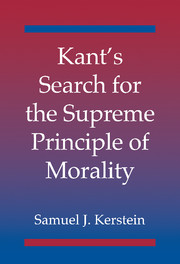Book contents
- Frontmatter
- Contents
- Acknowledgments
- Key to Abbreviations and Translations
- Introduction: Derivation, Deduction, and the Supreme Principle of Morality
- 1 Fundamental Concepts in Kant's Theory of Agency
- 2 Transcendental Freedom and the Derivation of the Formula of Universal Law
- 3 The Derivation of the Formula of Humanity
- 4 The Derivation of the Formula of Universal Law: A Criterial Reading
- 5 Criteria for the Supreme Principle of Morality
- 6 Duty and Moral Worth
- 7 Eliminating Rivals to the Categorical Imperative
- 8 Conclusion: Kant's Candidates for the Supreme Principle of Morality
- Notes
- Index
2 - Transcendental Freedom and the Derivation of the Formula of Universal Law
Published online by Cambridge University Press: 06 September 2009
- Frontmatter
- Contents
- Acknowledgments
- Key to Abbreviations and Translations
- Introduction: Derivation, Deduction, and the Supreme Principle of Morality
- 1 Fundamental Concepts in Kant's Theory of Agency
- 2 Transcendental Freedom and the Derivation of the Formula of Universal Law
- 3 The Derivation of the Formula of Humanity
- 4 The Derivation of the Formula of Universal Law: A Criterial Reading
- 5 Criteria for the Supreme Principle of Morality
- 6 Duty and Moral Worth
- 7 Eliminating Rivals to the Categorical Imperative
- 8 Conclusion: Kant's Candidates for the Supreme Principle of Morality
- Notes
- Index
Summary
Derivation in the Critique of Practical Reason: Allison's Reconstruction
Having settled on interpretations of some key concepts in Kant's theory of agency, we are ready to focus on the main topic of this book: Kant's derivations of the Formula of Universal Law and the Formula of Humanity. On the traditional reading, Kant's Groundwork derivation of the Formula of Universal Law contains a conspicuous gap. Before I construct and defend a new reading of this derivation, one according to which it is much more forceful and philosophically rich than the traditional construal implies, I first consider how some contemporary philosophers have responded to the traditional reading.
Kant offers a derivation of the Formula of Universal Law not only in the Groundwork, but in the Critique of Practical Reason as well. At the end of section 8 in the Analytic of Pure Practical Reason, Kant concludes that the Formula of Universal Law “is the sole principle that can possibly be fit … for the principle of morality, whether in appraisals or in application to the human will in determining it” (KpV 41). Kant clearly devotes parts of sections 1–8 to defending this conclusion. Therefore, in light of the apparent gap in Kant's Groundwork derivation of the Formula of Universal Law, it makes sense to look to the second Critique for a means to fill it.
According to Henry Allison, Kant's second Critique derivation relies explicitly on the premise that we have transcendental freedom.
- Type
- Chapter
- Information
- Kant's Search for the Supreme Principle of Morality , pp. 33 - 45Publisher: Cambridge University PressPrint publication year: 2002
- 1
- Cited by



